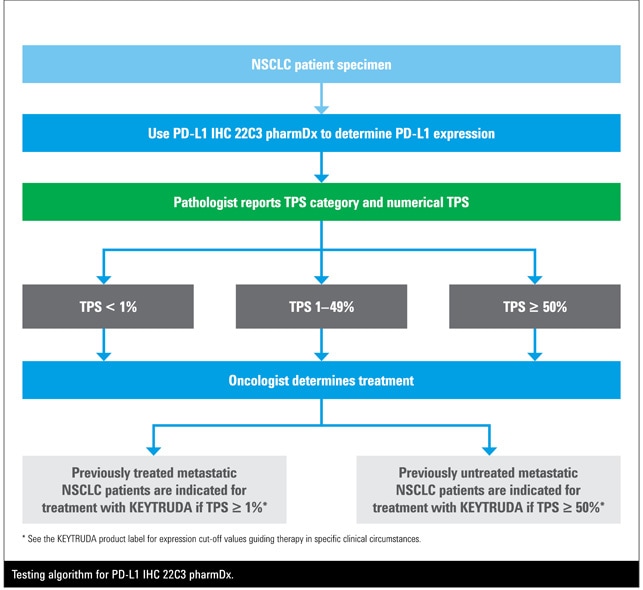
Use the flowchart to help inform Oncologist's treatment decisions with KEYTRUDA based on the patients Tumor Proportion Score (TPS) and treatment history.

1. PD-L1 IHC 22C3 pharmDx - Package Insert
2. KEYTRUDA is a registered trademark of Merck Sharp & Dohme Corp., a subsidiary of Merck & Co., Inc. See the KEYTRUDA product label for expression cutoff values guiding therapy in specific clinical circumstances.
3. Herbst RS, Baas P, Kim DW, Felip E, Pérez-Gracia JL, Han JY et al. Pembrolizumab versus docetaxel for previously treated, PD-L1-positive, advanced non-small-cell lung cancer (KEYNOTE-010): a randomised controlled trial. Lancet 2016;387(10027):1540-50.
4. Reck M, Rodríguez-Abreu D, Robinson AG, Hui R, Csőszi T, Fülöp A et al. Pembrolizumab versus chemotherapy for PD-L1-positive non-small-cell lung cancer. NEJM 2016. DOI: 10.1056/NEJMoa1606774.
Send us an email and we’ll get back to you
For in vitro diagnostic use
PD-L1 IHC 22C3 pharmDx is a qualitative immunohistochemical assay using Monoclonal Mouse Anti-PD-L1, Clone 22C3 intended for use in the detection of PD-L1 protein in formalin-fixed, paraffin-embedded (FFPE) non-small cell lung cancer (NSCLC) tissue using EnVision FLEX visualization system on Autostainer Link 48. PD-L1 protein expression is determined by using Tumor Proportion Score (TPS), which is the percentage of viable tumor cells showing partial or complete membrane staining at any intensity. The specimen should be considered to have PD-L1 expression if TPS ≥ 1% and high PD-L1 expression if TPS ≥ 50%.
PD-L1 IHC 22C3 pharmDx is indicated as an aid in identifying NSCLC patients for treatment with KEYTRUDA® (pembrolizumab). See the KEYTRUDA® product label for expression cutoff values guiding therapy in specific clinical circumstances.